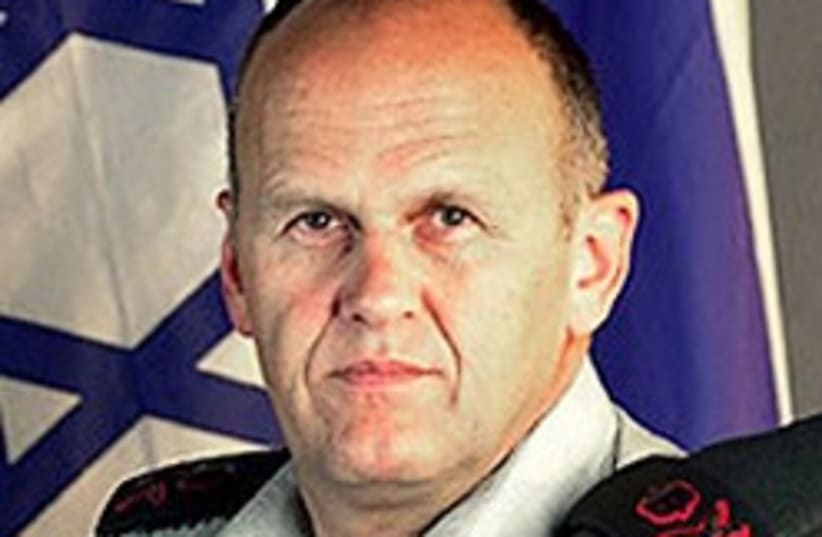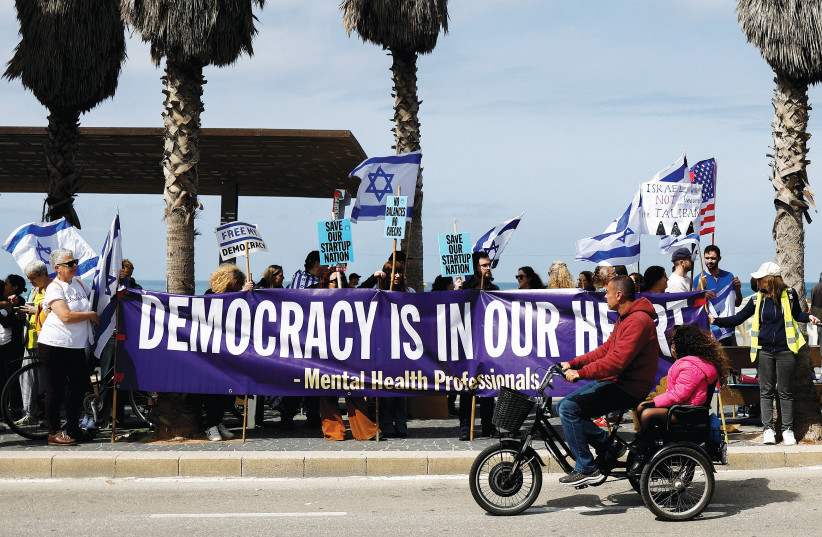Addressing the judicial overhaul and striking IDF reservists crisis, former IDF intelligence chief Aharon Zeevi-Farkash told The Jerusalem Post in an interview that if a compromise is not reached, the harm to Israel will be unbearable.
“There needs to be dialogue without one side trying to dictate the outcome. The legislative process needs to stop in order to allow a real dialogue and to obtain an agreement on the judicial overhaul issue. Otherwise, the judicial revolution will deal unbearable harm to the State of Israel,” he said.
The former IDF intelligence chief said that, “All of the experts say this. We can already see the grave harm which the open clash is having in impacting the prime minister’s desire to visit the US [the US government has indefinitely postponed Benjamin Netanyahu’s request to meet with US President Joe Biden] and the unwillingness of American Jews to meet with [Finance Minister Betzalel] Smotrich.”
Israeli and American relations
“I see the crisis with the US government and American Jewry as an existential crisis. Half of the Jewish nation is in the US. We cannot abandon it. Israel must be the home for all of the Jewish nationalities.,” added Zeevi-Farkash.
Next, he stated, “Israel must have consensus. Having consensus will only improve life in Israel and improve democracy. There is no disagreement on this. It is rooted in the culture [Bible] of the Jewish people: ‘Justice justice shall you pursue in order to live and in order to inherit the land.’ We have an obligation to the full spectrum of outsiders and to all of those who live here.”
He said with the striking reservists he understands and respects their position, but at the same time hopes they do not stop presenting themselves for their callup duty.
In terms of preventing a deterioration in Israel’s security readiness in the midst of IDF reservist strike threats, he explained, “I can’t imagine how things will be, after the Meggido terror attack [of last Monday] and less than a week before Ramadan. We also know the advancement of the Iran nuclear program has never been as dangerous as it is now.”
“When you look at all of this, it cannot be that someone in the State of Israel will not take up arms to defend the State. There is an ethical difficulty with this. The IDF cannot say we will drop our weapons. What will [Hezbollah chief Hassan] Nasrallah say?” he asked rhetorically.
Further, he said, “All of the efforts must be focused on getting a compromise by April 2. If that doesn’t happen, I still think the IDF must defend us, but it will be hard to hold together the ‘army of the nation’ concept and the spirit of volunteering.”
In addition, he stated, “If we are very divided, it will be very hard. Our enemies don’t care if we are a democracy or not a democracy. They will do everything to erase Israel from the map; We don’t want to see a situation where the country stops being a democracy. If the judicial revolution succeeds, I don’t see how the IDF, police and judiciary will continue.”
“We will stop being a magnet to the Jews of the world. Maybe there will be a reset. People will leave here because they will see that they cannot receive justice here, with a balance between Jewish and democratic principles,” he warned.
Zeevi-Fakash added, “We need to balance between the principles of the Jewish people, the land of Israel and Judaism.”
Moreover, he said that besides his former role in the IDF and his role heading the Israel Intelligence Heritage and Commemoration Center, he is also the head of Shazar Center which researches multiple generations of Jews – including: secular, religious, Sephardi and all the other “colors of Israel.”
He stated that researchers working on tracing and understanding the different identities that developed since 1948 found that the early generations had “burned into their consciousness” certain values, including their link with and bridging their origins in the Diaspora.
However, he warned that since 1948, no one has really fully dealt with the concept of how Jews from different backgrounds can best live together in their own land.
“The process [of how to adapt to a native Jewish homeland] was not completed by David Ben Gurion. Every day it gets harder because of the demographics and because of Jewish identity mutating. A large amount of the nation is not ready to be drafted into the IDF draft,” cautioned Zeevi-Farkash.
He argued, “I can’t understand how Haredim can call other Jews as Nazis. They have no idea what they are saying. All Jews are holy and are one nation. There is a disastrous conflict which could explode in our face. So it is very important to address these issues.”
Next, he stated that there should be meetings between rabbinic and secular thought leaders, as well as between more modern democracy-concerned air force pilots and more traditional rabbis “to try to dialogue about these issues.”
“The schism Is deep. There are five million Jews in the US. 45% of Jews’ identity is still in the Diaspora. We still haven’t dealt with the issue of how we live together,” he warned.
He concluded, “We can’t say it will just be fine,” if everyone ignores the gulf in Jewish identity between various groups, - “it isn’t just fine.”

